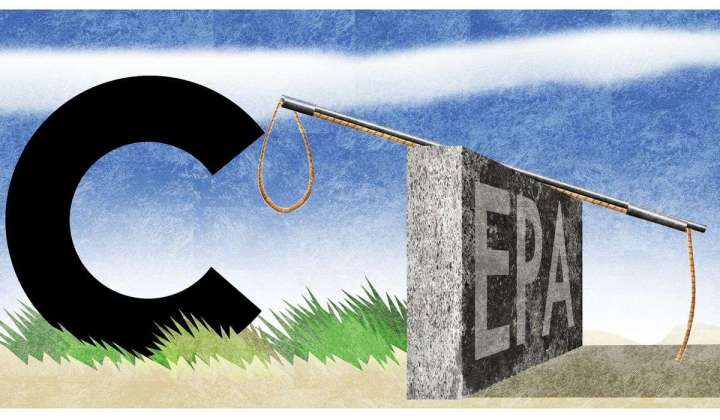EPA holds back climate change progress by slow-walking state permits

OPINION:
Shortly after being elected, President Biden announced that it was his goal for the U.S. electricity system to be “net zero” with respect to carbon dioxide emissions by 2035 and for the nation’s entire economy to be net zero by 2050.
At the same time, pretty much every analysis and projection, including those conducted by the federal government Mr. Biden nominally controls, has indicated that those net-zero goals are impossible without the widespread ability to capture carbon dioxide emissions and store them underground.
Some part of Team Biden recognizes this, as they fought for a more generous tax credit for such carbon capture and storage in the deliberations over the Inflation Reduction Act. That credit is $85 for each ton of carbon dioxide sequestered.
Unfortunately for Team Biden, other parts of the regime seem to be having trouble getting with the program, including the Environmental Protection Agency.
Like everything else in the world, carbon capture and storage requires a federal permit — in this case, an injection permit under the Safe Drinking Water Act. In most instances, the EPA allows states to run these programs and issue the permits. States that want this “primacy” over environmental programs have to apply to the EPA. There’s the rub.
Primacy applications from states typically take about two years to process and approve.
The state of Louisiana, home to chemical factories, refineries, oil and gas production (many of which want the program to start), and ideal geology for carbon dioxide storage, applied for primacy of the relevant permitting program in March 2021.
Since then, Louisiana has heard crickets with respect to its application, although the EPA has accepted the applications of Wyoming and North Dakota.
Louisiana Gov. John Bel Edwards is clearly at wits’ end with EPA Administrator Michael Regan, his fellow Democrat. He recently sent Mr. Regan a letter in which he somewhat plaintively asks if it would it be possible “to get a general timeline for preliminary decisions, paths of review, and when we might expect a public comment period to begin? Or would it be possible to have a designated point of contact within your office that my staff could reach out to regularly for status updates as the processing of the application moves forward?”
This is a material problem. As Mr. Edwards pointed out in the letter, investors are trying to determine whether Louisiana is the right place with the right program in which to invest their time and money. He wrote, “I believe that more information on the progress of Louisiana’s Class VI application would help encourage potential CCS operators to make firm investment decisions and to plan accordingly for meeting the specifics of Louisiana’s Class VI standards.”
Members of Congress have been less deferential.
Sen. Joe Manchin III, the West Virginia Democrat who is chairman of the Senate Energy and Natural Resources Committee, pointed out that the EPA has been dragging its feet, despite the cash Congress has sent it: “The infrastructure bill provides the EPA $75 million for Class VI well permitting including providing grants to states that take over the responsibility for permitting these wells. However, only two active Class VI wells have ever been permitted, and at least 30 applications are pending at the EPA.
“We’re never going to meet what we need to do with carbon capture because of the permitting process.”
Mr. Manchin is a bit confused. He seems to believe that everyone is on board with carbon dioxide capture and storage. The reality is that some part of the environmental community will never support the process because, to their way of thinking, it helps perpetuate an economic and energy system that needs to be destroyed, or at least radically restructured.
These are the same people who say they support zero-emissions nuclear power but will, in reality, take whatever steps they can to impede the building of nuclear power plants. The truth is that some in the environmental community want to remake the world, not just save the environment.
On this, as on so many other issues, Team Biden needs to decide which of their conflicting goals — pacifying their environmental (and donor) base or achieving the energy transition and meeting their own net-zero aspirations — they care about more.
They need to choose wisely.
• Michael McKenna, a columnist for The Washington Times, co-hosts “The Unregulated Podcast.” He was most recently a deputy assistant to the president and deputy director of the Office of Legislative Affairs at the White House.






